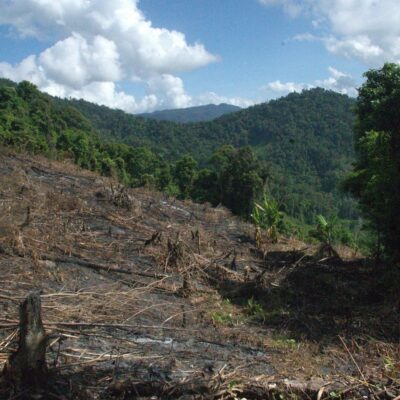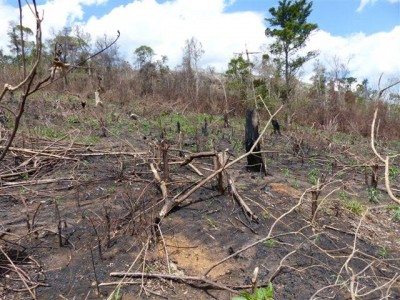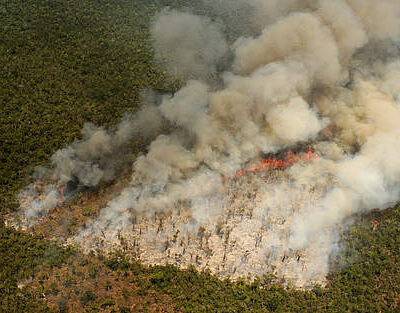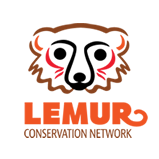Habitat Change and Loss in Madagascar

Lemur habitat is changing at an alarming rate.
This includes habitats across the island, including the eastern rainforests, the southern spiny forests, and the western dry deciduous forests. Changes to an animal’s habitat can negatively impact individual animals as well as entire species. With their habitats decreasing in size and degrading, lemur species and Madagascar’s other wildlife are at risk. There are three types of habitat change: loss, fragmentation, and degradation.
- Habitat Loss occurs when a large habitat area becomes smaller.
- Habitat Fragmentation occurs when a large area of continuous habitat is split into multiple pieces. This creates smaller pockets of habitats sometimes called “habitat islands” or “habitat shreds”.
- Habitat Degradation occurs when the condition or quality of a habitat is worsened.
Causes of Habitat Change in Madagascar
Habitat loss in Madagascar is driven by both business interests and the local need for food and income. Large companies clear land to produce products for sale and export. And, especially because Madagascar is one of the world’s financially poorest countries, local people need to clear land to grow food and to create fuel to both use and sell.
Business and Commercial Interests: Large Scale Habitat Loss and Fragmentation
Commercial Crops
Foreign and domestic commercial agriculture significantly contributes to deforestation in Madagascar. Businesses often clear forested land to grow crops that they export to other countries, or to produce products they sell in Madagascar or elsewhere. These businesses often deny knowing that the supply chain for their products is a conservation issue. So, these companies either knowingly or unknowingly use crops that were planted on cleared forests. For example, in western Madagascar, many speculate that the French Castel Group, which runs STAR brewing company, has paid local people to clear forests and plant corn (or maize) for their products. Learn more about this investigation on Mongabay.
Illegal Export of Rosewood
Additionally, the northeastern rainforests of Masoala and Makira National Parks are at risk from the illegal logging and export of rosewood. International companies often clear cut these forests for rosewood, which is used in Asia to create furniture and other products. While this is illegal, it is not well regulated. Articles from Mongabay explain how this illegal trade continues, and how those who try to stop it are sometimes punished.
Mining
An increasing threat to Madagascar’s biodiversity is mining. Mining occurs throughout Madagascar as workers scour the earth for gems like sapphires; crystals like rose quartz and amethyst; and minerals like nickel and cobalt. While the mining industry does provide much needed jobs, it also destroys the land and sometimes causes large migrations of people looking for work.
- What happens after a mining rush? Photographs from Madagascar
- A rush for Madagascar’s gemstones is exacerbating destruction of critical wildlife habitat
- Over 10,000 children in Madagascar are mining mica for everyday American products
- Demand for ‘healing’ crystals is soaring – but many are mined in deadly conditions in one of the world’s poorest countries

Food, Fuel, and Income: Small Scale Habitat Loss and Fragmentation
Slash and Burn Agriculture, or Tavy
In Madagascar, slash and burn agriculture is called tavy. Tavy occurs when an area of forest is cleared and then burned. This burned vegetation creates an ash that temporarily provides nutrients to the infertile soil, so that a farmer can grow crops. However, the nutrients usually only last a couple of growing seasons. While the original plot of land will eventually regenerate, it can take 10 to 15 years. With this slow regeneration time, farmers have to choose between returning to land that has not yet fully recovered, or burning new plots of land to start the process over somewhere else. This has created a patchwork of forest fragments across Madagascar.
Slash and burn agriculture was not as problematic when human population numbers were lower and more stable. But this is no longer the case. With Madagascar’s human population increasing rapidly, there is not enough new land to be cleared and burned for tavy to be sustainable.
Charcoal Production
Charcoal is the main source of cooking fuel in Madagascar. Because it is made by burning pieces of wood until only the coal remains, it has a heavy impact on forests. In Madagascar, people living near forests not only produce charcoal for their own use but also sell it in cities. While this is a national problem, in northern Madagascar, the forests in Montagne des Francais are at extreme risk from illegal charcoal production for the nearby city of Antsiranana, also known as Diego Suarez. This forest is the only home for the critically endangered northern sportive lemur. Learn how Madagascar Biodiversity Partnership is working at Montagne des Francais to protect habitat through alternative fuel sources.

Uncontrolled Fires: Habitat Degradation
It is illegal to start fires in national parks and other protected areas. But, slash and burn agriculture (called tavy) is still the primary method of clearing land for agriculture. Sometimes, fires started for tavy outside of park boundaries get out of control and encroach on forests where lemurs live.
Fire prevention and control is extremely important to protect remaining wild habitat. Learn about Planet Madagascar’s fire management program in Ankarafantsika National Park, home to coquerel’s sifakas and other lemurs.
Conservation Solutions for Habitat Change
When addressing habitat change and loss, it is important to address human needs as well as the needs of wildlife. Healthy and supported Malagasy people are the key to long term conservation in Madagascar. Some conservation solutions for habitat change, loss, and fragmentation are:
- Supporting people through employment, healthcare, and sustainable food sources
- Reforestation to replenish habitats and connect forest fragments
- Monitoring parks and reserves to prevent fires and illegal exploitation
- Developing and providing alternative cooking fuels and fuel efficient stoves
- Working with Madagascar’s government to improve laws and consequences for companies who profit off of illegal or unsustainable business practices
